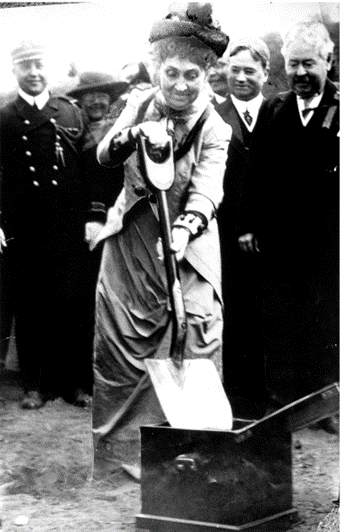American Benefactresses of European Tapestry: Art Philanthropy Stateside Circa 1900

Mrs. Phoebe Apperson Hearst at a building site on the Berkeley campus of the University of California, 1901. Photographer unknown. https://light.berkeley.edu/p/promise-may-2018/150-years-light/
Charissa Bremer-David
Tuesday, May 23, 2023
At the turn of the Twentieth Century, when women’s economic independence was fraught and their political rights negligible, female philanthropy emerged as educated and well-traveled heiresses of affluent American industrialists came to control money and make discretionary donations in certain prescribed circumstances. Within broader societal and economic influences, the reasons and motives for their actions were often deeply personal and entirely consistent – and acceptable in accordance – with their feminine roles as daughters, wives, mothers, and widows. This talk will explore cases when their art philanthropy benefited houses of worship and local nascent museums, to lasting effect. Drawing upon period records of three U.S. dealers specializing in European tapestry (Charles Mather Ffoulke, Sypher & Co, and French & Co) we will consider specifically how and why the medium of tapestry was deemed an especially meaningful and transcending form of cultural legacy.
Charissa Bremer-David is an object-based art historian specializing in early modern European decorative arts. She worked with the collection of the J. Paul Getty Museum for many years, serving as curator of sculpture and decorative arts from 2008 to her retirement in 2020. She curated several exhibitions, notably Woven Gold, Tapestries of Louis XIV (2015) and Paris: Life and Luxury in the Eighteenth Century (2011) and edited their accompanying catalogues, and has published extensively on French tapestries. Her research interests span material culture, East-West trade, provenance, the development of the trans-Atlantic art market, and the birth of American art museums at the turn of the Twentieth Century.
